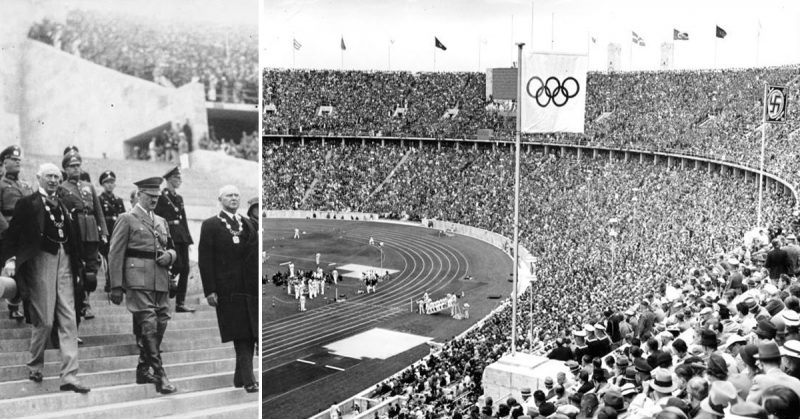The 11th Olympic Games in Berlin on August 1, 1936, were opened by Adolf Hitler. It was the first Olympics to feature the lone runner carrying the torch from Olympia, Greece – the site of the ancient Olympic games – to the stadium.
It was a PR stunt for the Nazi party. The relay was meticulously planned by Nazi regime to present the Third Reich as a modern, economically strong and influential nation.
Hitler was attempting to impress foreign visitors with how they handled the Games. Carl Diem organized the Games for the Nazis. He based the relay on one performed by the Ancient Greeks in 80 BC. He was attempting to connect the ancient Games to the modern Nazis.
The idea resonated well with the belief that ancient Greece was an Aryan forerunner state to the Third Reich. It was a perfect blend of propaganda and historical perversion. Torchlight parades and rallies were already used to attract Germans, especially young Germans, to the Nazi movement.
The torch was built by Krupp Industries, a major manufacturer of Nazi weapons.
There were controversies in the 1936 Games. Despite Hitler’s statement about uniting “combatants in understanding and respect,” the Nazis tried to keep Jews and blacks out of the competition. The official Nazi Party newspaper released a statement that it was “a disgrace and degradation of the Olympic idea” having whites compete with blacks. “Blacks must be excluded,” it said. “We demand it.”
Activists and other groups pushed for a boycott of the Games in response to the article. Eventually, the Nazis backed down and agreed to allow “competitors of all races,” but insisted that the racial makeup of their own team was up to the Germans (though they did add Helene Mayer, whose father was Jewish. She won the silver medal).
Hitler cheered loudly when German athletes won but showed contempt for other athletes, including Jesse Owens and other black American athletes. He reportedly said, “It was unfair of the United States to send those flatfooted specimens to compete with the noble products of Germany … I am going to vote against Negro participation in the future.”
But the most disappointing aspect of the Olympics in 1936 is that the propaganda actually worked on visitors and athletes in spite of the racism. William L. Shirer, the American author of The Rise and Fall of the Third Reich, wrote that he was disappointed with how tourists responded positively to the whole show.
According to Rudi Josten, a German writer for the AP bureau, “Everything was free, and all dance halls were reopened… They played American music and whatnot. Anyway, everybody thought, ‘Well, so Hitler can’t be so bad.’”
